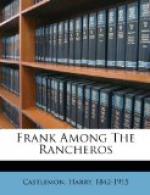“Of course,” continued the Ranchero, not heeding the interruption, “when you fail to make your appearance at home for three or four days, your uncle will think he has seen the last of you. He will believe that you have been clawed up by grizzlies, or that you have tumbled into some of these gullies. He will raise a hue and cry, search high and low for you, offer rewards, and all that; and, while the fuss is going on, and people are wondering what in the world could have become of you, you will be safe and sound, and living like a gentleman, with me, on the fat of the land.”
“But, Pierre,” said Frank, now beginning to be really frightened, “I don’t want to live with you on the fat of the land, and I won’t do it. Let go that bridle.”
The Ranchero, as before, paid no attention to the interruption. He seemed to delight in tormenting his prisoner.
“After you have been with me about six months,” he went on, “and your friends have given up all hope of ever seeing you again, I’ll send a note to Mr. Winters, stating that you are alive and well, and that, if he will give me twenty thousand dollars in gold, I will return you to him in good order, right side up with care. If I find that we can get along pretty well together, I may conclude to keep you a year; for the longer you remain away from your uncle, the more he will want to see you, and the bigger will be the pile he will give to have you brought back. What is your opinion of that plan? Don’t you think it a capital way to raise the wind?”
Frank listened to this speech in utter bewilderment. Cruel and reckless as he knew Pierre to be, he had never for a moment imagined that he could be guilty of such an enormous crime as this. He did not know what reply to make—there was nothing he could say or do. Entreaties and resistance were alike useless.
“Well, what are you thinking about?” inquired the Ranchero.
“I was wondering if a greater villain than yourself ever lived,” replied Frank.
“We will talk about that as we go along,” said Pierre. “Get off that horse, now; I am going to send him home.”
Frank, seeing no way of escape, was about to obey this order, when the truant, Marmion, came in sight, trotting leisurely up the path, carrying in his mouth the rabbit, which he had succeeded in gnawing out of the log. He stopped short on discovering Pierre, dropped his game, and gathered himself for a spring.
“Take him, Marmion!” yelled Frank, as he straightened himself up in his saddle. “If it is all the same to you, Mr. Pierre, I’ll not go to the mountains this evening.”
The Ranchero did not wait to receive the dog. He was an arrant coward, and, more than that, he stood as much in fear of Marmion as if he had been a bear or panther. Uttering a cry of terror, he dropped the bridle, and, with one bound, disappeared in the bushes. Marmion followed close at his heels, encouraged by terrific yells from his master, who, now that his dog was neither bound nor muzzled, looked upon the capture of the robber as a thing beyond a doubt. There was a loud crashing and snapping in the bushes, as the pursuer and pursued sped on their way, and presently another loud yell of terror, mingled with an angry growl, told Frank that the dog had come up with Pierre.




